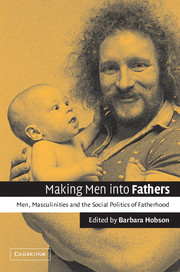Book contents
- Frontmatter
- Contents
- List of figures
- List of tables
- Preface
- Introduction: making men into fathers
- Part 1 Who fathers?
- Part 2 Men in social policy and the logics of cash and care
- Part 3 Resisting and reclaiming fatherhood
- 7 Making sense of fatherhood: the non-payment of child support in Spain
- 8 The Fatherhood Responsibility Movement: the centrality of marriage, work and male sexuality in reconstructions of masculinity and fatherhood
- Part 4 Theorizing men, masculinities and fatherhood
- Notes
- References
- Index
8 - The Fatherhood Responsibility Movement: the centrality of marriage, work and male sexuality in reconstructions of masculinity and fatherhood
Published online by Cambridge University Press: 22 September 2009
- Frontmatter
- Contents
- List of figures
- List of tables
- Preface
- Introduction: making men into fathers
- Part 1 Who fathers?
- Part 2 Men in social policy and the logics of cash and care
- Part 3 Resisting and reclaiming fatherhood
- 7 Making sense of fatherhood: the non-payment of child support in Spain
- 8 The Fatherhood Responsibility Movement: the centrality of marriage, work and male sexuality in reconstructions of masculinity and fatherhood
- Part 4 Theorizing men, masculinities and fatherhood
- Notes
- References
- Index
Summary
During the past few years, liberal and conservative politicians and policy makers alike in the United States as well as in European welfare states have increasingly identified fatherlessness as a social crisis of top priority. A crucial set of actors in shaping and reframing this debate in the United States defined themselves as belonging to the Fatherhood Responsibility Movement. Within this “movement,” one may discern a range of groups with competing masculinities and contesting claims and grievances. Nevertheless, there are apparent convergences of strategic, or real, points of agreement. The constituencies of the different organizations have different social locations in relation to the state, and they consequently, but not predictably, have different agendas for reform. In public demonstrations, the Fatherhood Responsibility Movement seeks to overcome barriers of income, race and politics. It includes men's organizations as diverse as fathers' rights groups, pro-marriage groups, mythopoetic men's movements, fatherhood programs for low-income minorities, and faith-based grass roots manifestations such as the Promise Keepers and the Million Man March (see Horn et al. 1999). By highlighting contesting masculinities within US family politics, this chapter illustrates the ways notions around marriage, work and male sexuality shape the debate on father responsibility.
“The family” is a contested cultural and symbolic concept in many countries; it is perhaps more fiercely contested in the United States than in many other countries. Notions of “the family” are a matter of profound social and emotional tension in American politics.
- Type
- Chapter
- Information
- Making Men into FathersMen, Masculinities and the Social Politics of Fatherhood, pp. 213 - 242Publisher: Cambridge University PressPrint publication year: 2002
- 6
- Cited by



